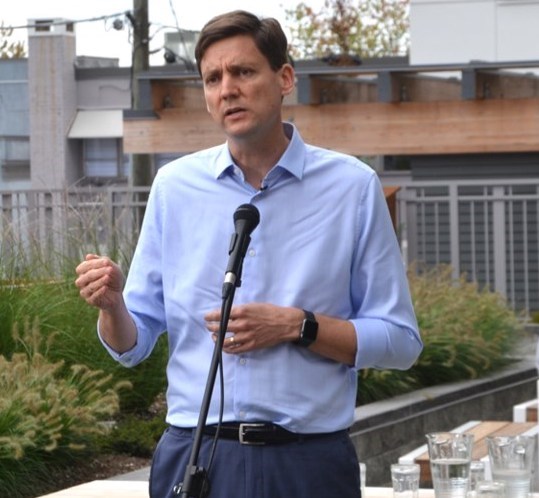David Eby, front runner and virtually the only leadership candidate for the B.C. New Democratic Party, has outlined an expansive “affordable housing” program that appears a boon to real estate speculators, especially in the current down-trending market.
The sweeping legislative platform from the apparent premier-in-waiting, released September 28, promises to penalize short-term flippers of residential real estate, force B.C. municipalities to approve new housing and outlaw bans on rentals in strata buildings. It will also allow any detached house in the province to be converted into three housing units.
The most radical idea will set up at $500 million provincial fund to allow First Nations, non-profits and tenant groups to have first right to buy existing multi-family affordable rental buildings that come up for sale.
Eby says the province doesn’t want tenants and home buyers “competing for a place to live with a bunch of speculators and investors that are driving prices up."
Yet a close look at each of the major platform planks shows that is exactly what is being proposed.
Here is a breakdown of the Eby BC NDP housing platform through an investor’s lens.
• Outlaw of ban on rental condos: Investors currently shy away from strata buildings that don’t allow rentals. When the province outlaws the right of a Strata Corp. to restrict rentals, it will encourage investors, especially in Metro Vancouver, where they can profit from the highest rental rates and lowest vacancies in the country. Also, a number of condo owners who do not want to live in a rental-friendly building, may sell their units, which will increase the selection for condo investors and speculators.
• Overriding municipal authority: For investors who assemble detached housing lots for the potential of higher-density development, this policy removes much of the risk. By appealing to the province, the investor could have a multi-family permit fast tracked – over the objections of the local city hall and neighbours - and sell the assembled land more quickly to a developer.
• Blanket triplex zoning: Currently in B.C., the average detached house costs $1 million. By allowing each house to be automatically zoned to allow three housing units, the value of each house will suddenly increase. This is also a boon to investors who build new homes because they can add two rental suites as a “mortgage helper” and raise the sale price of the house by an estimated 20 per cent to 30 per cent.
• $500 million fund to buy rental buildings. Today it is harder for B.C. landlords to sell older apartment buildings because of the provincial annual rental cap of 1.5 per cent, the often expensive repairs needed and provincial restrictions on renovations. But, with a $500 million war chest of taxpayer money, the sale would be nearly assured. Tenants, First Nations and non-profits will lobby to purchase these aging properties with provincial backing, very likely at higher than market prices. The B.C. government has a track record of paying far above BC Assessment value when purchasing rental property. (Of course, once the tenants become owners and begin to deal with the Residential Tenancy Act as landlords. they may understand why the owner was so eager to sell.)
• Tax on flippers: None of the investors or speculators above need worry about this toothless policy. Under Eby’s proposed flipping tax, the tax rate is not disclosed, but it would be phased out after two years of ownership. Home flipping has already disappeared in B.C., however. Home prices in the Lower Mainland have been falling month-over-month since March and, according to the BC Real Estate Association, average home prices in B.C. are forecast to decline a further 3.1 per cent in 2023. Investors, therefore, can, in theory, buy into the current market dip, enjoy high rental income for two or three years and then cash out just as the government changes and the real estate market recovers.
- Frank O'Brien is the editor of Western Investor



